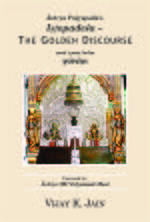Acharya Shri 108 Pujyapada Ji Maharaj | |
|---|---|
 Digambara Acharya | |
| Personal | |
| Born | Devanandi 464 CE |
| Died | 524 (aged 59–60) |
| Religion | Jainism |
| Parents |
|
| Sect | Digambara |
| Notable work(s) | Sarvārthasiddhi, Iṣṭopadeśa |
| Religious career | |
Disciples | |
| Part of a series on |
| Jainism |
|---|
 |
Acharya Pujyapada or Pūjyapāda (464–524 CE)[1] was a renowned grammarian and acharya (philosopher monk) belonging to the Digambara tradition of Jains. It was believed that he was worshiped by demigods on the account of his vast scholarship and deep piety, and thus, he was named Pujyapada. He was said to be the guru of King Durvinita of the Western Ganga dynasty.[2]
Pujyapada is said to have lived from 510 CE to 600 CE.[3] Born under the name Devanandi to parents Madhava Bhatta and Shridevi,[4] he was a sadhu Digambara monk, as well as a yogi, mystic, poet, scholar, author and master of several branches of learning.[5] As the Devs from heaven used to come to do Puja of his feet Paad, the title of Pujyapaad was given to him. [6] He was heavily influenced by the writings of his predecessors like Acharya Kundakunda and Acharya Samantabhadra. He is rated as being the greatest of the early masters of Jain literature.[7] He was prominent preceptor, with impeccable pontifical pedigree and spiritual lineage. All of his work was written in Sanskrit, in prose as well as verse form.[8] He was pontiff of the Nandi sangha, which was a part of the lineage of Acharya Kundakunda. He was the tenth guru of the pontifical lineage of the Nandi Sangha. He was born in a Brahmin family of Karnataka.[3]
It is likely that he was the first Jain saint to write not only on religion but also on non-religious subjects, such as ayurveda and Sanskrit grammar. Acharya Pujyapada, besides being a scholar on Jainism and a mendicant walking in the footsteps of the Jinas, was a grammarian,[9] master of Sanskrit poetics and of ayurveda.[citation needed]
Pujyapada gave the definition of Dāna (charity) as the act of giving one's wealth to another for mutual benefit in Sarvarthasiddhi.[10]
